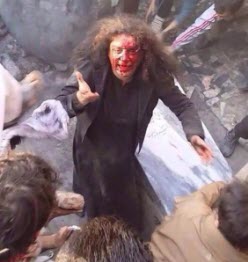Boreal
Farkhunda, the Hypatia of a New Dark Age
The Dark Ages is generally accepted to be the period in our history between 400 and 1000 AD. Islam is a product of that gloomy period when irrational beliefs, superstitions and unfounded fears overwhelmed common sense and reason.
For author Thomas Cahill, the defining moment when civilization lost its mind, and its humanity, is the murder of Hypatia of Alexandria in 415.
A wild-eyed army of illiterate, black-cowled monks filled the streets of Alexandria like so many crazed bats … Now they encountered Hypatia, a philosopher and mathematician on her way home … She was a pagan teacher, an unescorted woman; she did not bow to their beliefs. She lured impressionable young Christians to her lectures; she consorted with Jews; she had dared speak against the patriarch … They dragged her from her carriage and into the cathedral, where they stripped her; gauged her eyes out, skinned her alive, and tore her to pieces with jagged tiles ripped from the mosaics…
Mysteries of the Middle Ages, Knopf Doubleday, 2010
Woman falsely accused of burning Koran is killed by mob.
The 27-year-old religious scholar Farkhunda was beaten, pushed from a roof, run over by a car and set alight before her body was thrown in the Kabul River.
Globe and Mail, March 23, 2015
Farkhunda pleading for her life (Wiki)

How do you get people to do something like this. It is not simply overcoming a reluctance to kill; it is killing in a most cruel way and enjoying every minute of it, not unlike the example of the deity whose greatness is noisily proclaimed while a defenceless human being is horribly put to death.
Rest in peace Farkhunda. You're death, and the way you died cries out for a dialogue on the Koran, lest your name, like Hypatia, be forever associated with the spreading shadow of a new Dark Age.
Bernard Payeur